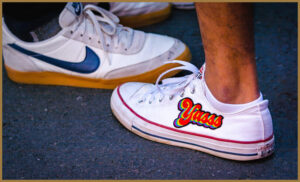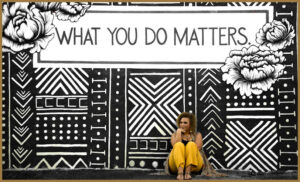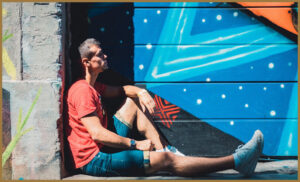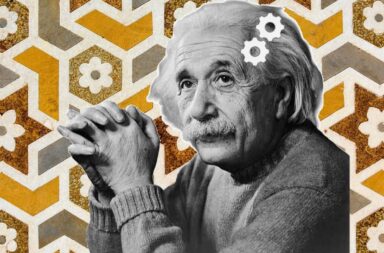Confidence in autism is a funny thing as, whilst you would expect a condition defined by anxiety and social complications to see autistic people have the self-esteem of a dormouse, for many people with autism, confidence flows through us like a student who states they ‘work better under pressure’ (before they realise that they don’t).
Of course, this autistic confidence can be hard to find as we barricade ourselves behind routines and rituals. Yet, if you can source the key to Fort Comfort Zone, inside you will find one self-assured autist desperate to communicate (if it’s a topic we’re interested in) and up to learn/take on new opportunities (so long as they don’t seem too ‘new’).
But how do you get access to an autistic person’s confident side and what can we do to pull this confidence out? Well, today, I have ten such suggestions on this very topic.
1. Pick your Battles

Confidence can often feel like rolling a big old boulder. When it’s going well, we have great momentum and things only seem to get easier but, when we hit a bump, we can see our confidence greatly decrease – which, for autistic people who tend to over analyse, can be a particular problem as we usually dwell that extra bit longer on any blows to our self-esteem.
To avoid the Holy Grail level of retreat which this can cause, autistic people should be encouraged to try and get their confidence boulder rolling early. This can be done by building up a momentum with a series of smaller/similar experiences first. For example, if an autistic person freezes up in crowds, start with short meetings where the number of people they do know outweigh those they don’t.
Alternatively, it’s fully justified to avoid an overly hazardous event if you feel it will do more damage in the long run. However, before you do call in to say that your dog ate your desire to show up, consider whether you are really doing this because you believe it will help or whether it’s just plain old jitters getting the better of a situation.
2. Build New Skills

If we consider that confidence is self-belief in our skills and abilities, then it’s unquestionable that, for those who are currently lacking in it, picking up a new skill or ability can help improve it. This can come in the form of joining a club or starting a new hobby – ideas for which can be found in my 2 autistic hobbies, activities and sports articles, which include highlights such as:
- Drawing
- Swimming
- Trampolining
- Yoga
- Chess
- Dungeons & Dragons
[read the full articles here and here]
Of course, whilst the range of options might at first seem overwhelming (and you may even pick the wrong choice first time around), once you do find something you can sink your teeth into, the benefits are visible almost immediately, as we cut our teeth on meeting and interacting with people in a situation where we don’t have to rely on words (was that too many ‘teeth’ metaphors?).
Nevertheless, it should be worth noting that, when picking up any new skill like this, there will always be a learning curve – which at some point or another can work to pit us against the enjoyment of these new experiences. So, when this does happen, try not to be deterred, as quitting at these pivotal points can make us drop further than we may have grown and lead to a dangerous ‘I’m not good enough’ mindset.
3. Celebrate Every Achievement

Confidence is unquestionably born out of success. However, for far too many autists successful experiences seem few and far between. Over time, this can lead to a diminished opinion of our abilities and achievements; a domino effect which ultimately hurts our confidence.
Helping autistic people to recognise that this need not be the case is therefore crucial in reclaiming a reason to stand up straight – something which is made a lot easier by encouraging autistic people to share/discuss/remember 3 things they are proud to have done each day.
These three things can range from anything as large as climbing Mount Everest to just remembering to water a plant, as it’s not the action of remembering the achievement that will put some pep in your step but the realisation of all we can and do achieve.
On the note of recording your wins, I always encourage people to document these in a book (or have someone help the autist write them down), as few things will give you quite the ego boost as being able to get to the last page and realise you have filled an entire book with your greatness.
4. Learn to say ‘Yes’

While your comfort zone may well and truly be, erm, comfortable, it’s not always in your best interest to reside there for too long. This is because, while comfort zones do offer a nice respite for the active autistic mind, they also pose 2 larger risks to our confidence which are rarely worth the relaxation:
- Any confidence you do develop will be fragile, as it is purely built around what you know and not what you don’t.
- While we all grow in some way each day, safe havens forever stay the same size, making them feel cramped over time and eventually leaving no room for others.
By learning to say ‘yes’ to new opportunities, these issues can be avoided, giving us valuable experiences to develop our confidence in a broad range of scenarios. Whilst at first you would think that this means saying bon voyage to our beloved comfort zones, what you will quickly realise is that the new can itself become comfortable, changing this safety vacation into more of a comfort zone extension.
if you support someone, teaching someone to say ‘yes’ is more about learning not to take ‘no’ as an immediate response. For example, if most questions are constantly met with rejection, try to understand their reasoning and look for a middle ground, which feels more like something they decided on (rather than something you had to negotiate out of them).
5. Learn to say ‘No’

On the other side of the coin, autistic confidence can often sink faster than the Titanic if we feel that we are constantly being led into decisions which are made by others. This can be a problem for autistic people as, despite our mind’s unique way of thinking (or perhaps, in spite of it), we can often get caught in the pack listening to others and afraid to stand out by sharing alternative views.
That’s why learning to say ‘no’ in moderation can be a powerful tool for autistic people as, in two simple letters, you are taking back control of what others want and also avoid the awful possibility of autistic manipulation (more of which can be read on here).
Once again, for those who are supporting autistic people, this one is a little bit trickier, as telling someone to say no is somewhat of a Catch 22 (where they would have to say ‘yes’ to take your advice). So, instead of encouraging the word ‘no’, start asking your loved one what they think about events or choices and if they’re not happy with it, then say that they don’t have to do it, but they have to take control by selecting a substitute activity.
6. Overcome Imposter Syndrome

Many autistic people struggle to feel confident in situations, as we often feel like we don’t deserve to be there (in fact, for some autistic people we even feel at odds in our own community, as we aren’t an exact match for the examples of the spectrum we see). This state of mind, which gives us an inability to recognise our value, is known as Imposter Syndrome and, whether it’s holding us back at work or with friends, it’s incredibly damaging for our confidence.
Although not true for everyone, it’s often the case that we develop Imposter Syndrome by inaccurately comparing ourselves to those around us. A few years ago, this was only a minor issue, but with the advent of social media (where everyone is constantly perceived as living their best life), this has become more prevalent as we falsy believe that those we surround ourselves with are better than us, or we end up having to push lies ourselves which only makes us feel more false.
Taking social media breaks can be a great way to avoid this and, if you use the time to talk to people about your insecurities, these hiatus will often lead to some great realisations like:
- You’re underselling yourself
- Everyone gets imposter syndrome at some point – except, ironically, actual imposters themselves
7. Find A Confident Frame of Mind

We’ve come a long way since the days that we thought all autists were incapable of empathy. In fact, we’ve come so far that we now no longer see autistic people as having too little emotion but way, way too much.
This can be seen in how autistic people seemingly absorb any feelings within the room we enter, making the spectrum somewhat of an emotional sponge for hope, optimism and any of the other emotions which inspire confidence in people – see where I’m going here?
For this reason, surrounding an autistic person with things which instil confidence such as movies, songs, books, podcasts and, in general, positive people, is an excellent hands-off way of helping autistic people adapt into our more confident selves. Similarly, guiding autistic people away from any material which has the opposite effect can provide the same outcome.
8. Learn to Accept Failure

In many examples of confidence-building techniques, people will say that you should look at a misstep as an opportunity to learn and not a failure. However, I am hesitant to believe that there is a lesson in everything, as giving your all, only to come up short, or standing up for yourself, only to fall flat on your face, is sometimes down to luck of the draw; where subsequently pushing yourself as a result of this misfortune can set false expectations.
This doesn’t mean that failure should be avoided at all cost though, in fact, it’s quite the opposite, as trying to repress or avoiding any discussion of an awkward incident will only mean that your festering thoughts continue far longer than necessary.
The middle ground here is that, when things do go off plan, we need to accept that this is just part of life, where sometimes you win and sometimes you don’t. In many cases this is easier said than done, I mean, I still think about when I stuck my hand in Thornton’s chocolate fountain and got banned from the shop for life, but being open about it has made me accept it and helped me move on.
9. Take Care of Your Body

Okay, so I know you probably saw this one coming (and subsequently winced at the upcoming thought of exercise). However, it really is undeniable that, if you take care of yourself physically e.g. eating well, working out and getting plenty of sleep, your mental health will improve alongside.
Of course, this doesn’t change the fact that most self-care efforts are long, tedious yawn-fests. Yet, for autistic people who can quite easily fall into a rhythm, our minds can give us a headstart when it comes to harnessing these advantages; as we are more likely to keep the activities up once we get past the usual hurdles, like restricted eating and general sleep challenges (both of which I linked have solutions for).
Additionally, thanks to the endorphins which are realised during both eating and exercise, these two activities can help give a temporary boost to self-confidence, which makes them ideal to do before trying out any of the other things on this list (just remember that this is only the case for eating and exercising and not sleeping – as trying to force an autistic person to do something the minute we wake up can only spell disaster).
10. Don’t Change

‘Fake it ’til you make it’, ‘Dress for the job you want’ ‘Play the part’, it’s frankly bizarre how many times people will say that confidence will come from being something that you are not, when true confidence comes from being entirely satisfied with who you are.
This is dangerous within the autism community, where suppressing our identity is so much of a problem it has a name: ‘masking’. That’s why my last piece of advice today is to simply be yourself.
Encouraging someone to feel confident in themselves is no easy task though, as it comes from being in the right place, at the right time, with the right mindset and much more. As such, if an autistic person does seem to struggle in themselves, try working on external factors that might be standing in the way and not improving the person themselves. For example, maybe harsh lights are making us feel uneasy or maybe too much uncertainty means our mind is somewhere else, for every problem there is a cause and blaming the person and not the problem will only make this worse.
Carry on the Conversation:
What tips do you have that could help autistic people build confidence and self-esteem? Let me know in the comments below. And, if you believe that a lack of confidence is the result of anxiety, then why not check out this article on 5 Tips to Help Manage Anxiety in Autistic People?
As always, I can also be found on Twitter @AutismRevised, on Instagram @autisticandunapologetic and via my email: AutisticandUnapologetic@gmail.com.
If you like what you have seen on the site today, then show your support by liking the Autistic & Unapologetic Facebook page. Also, don’t forget to sign up to the Autistic & Unapologetic newsletter (found on the sidebar on laptops and underneath if you are reading this via mobile) where I share weekly updates as well as a fascinating fact I have found throughout the week.
Thank you for reading and I will see you next time for more thoughts from across the spectrum.


